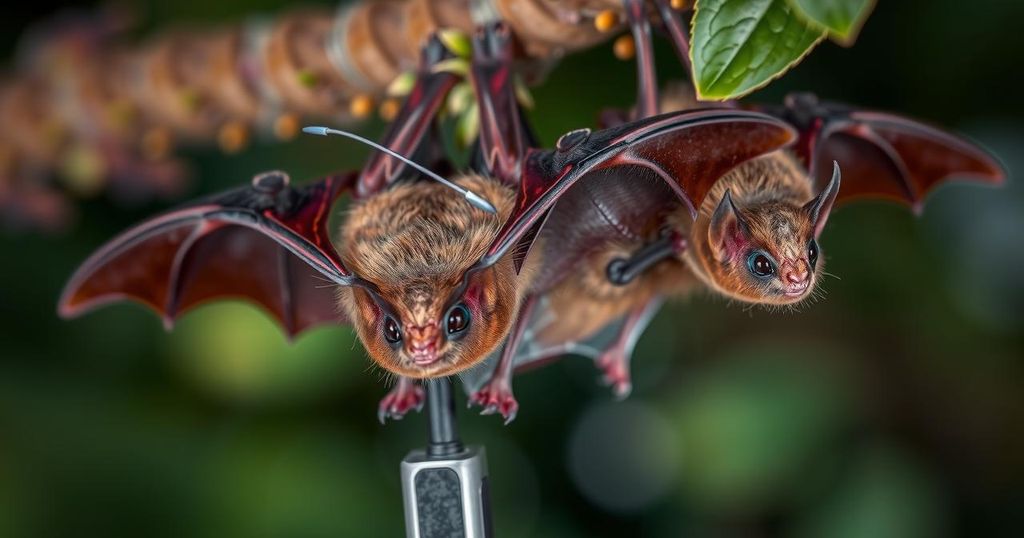Rwanda Implements GPS Tracking for Bat Monitoring to Combat Zoonotic Diseases

Rwanda’s Ministry of Health will implement GPS tracking to monitor bats in efforts to prevent zoonotic diseases. Following the recent Marburg virus outbreak, this initiative aims to enhance understanding of bat behaviors and migrations to reduce risks of disease transmission to humans. Key strategies include focused monitoring during peak virus shedding periods and fostering collaboration across public health sectors.
The Rwandan Ministry of Health has announced the implementation of GPS tracking technology to monitor bat migration patterns and behaviors. This initiative aims to bolster the prevention and surveillance of zoonotic diseases as declared by Minister of Health Dr. Sabin Nsanzimana during a media event on December 20. The minister stated the tracking of bats would commence in the upcoming weeks, following the official declaration of the Marburg virus outbreak’s conclusion. This particular outbreak was traced back to fruit bats, emphasizing the critical link between animal behavior and the transmission of diseases to humans.
Dr. Nsanzimana highlighted the importance of targeted monitoring periods, particularly in February and August when bat populations are known to shed higher levels of viruses. Emphasizing a proactive approach, he noted, “We will focus on collecting more samples from bats in mining areas during these months.” A dedicated team, referred to as ‘batmen’, has been established to undertake these efforts, enhancing public health protection and contributing to global scientific knowledge.
Furthermore, Dr. Nsanzimana pointed out the necessity for cross-sectoral collaboration to address zoonotic risks effectively, stating, “This is not just a health issue; it concerns all of us, health, agriculture, animal resources, and more.” He underscored the ecological significance of bats, which play a vital role in pest control and maintaining ecological balance, while also posing risks when human activities disrupt their habitats. The Ministry has identified over 50 bat habitats in mining areas, implementing safety measures to prevent miners from interacting with these animals.
Additionally, Dr. Brian Chirombo, the World Health Organization (WHO) Representative to Rwanda, underscored the crucial lessons learned from the Marburg outbreak. He stressed the need for enhanced international health regulations and the interconnected nature of health sectors, echoing the One Health approach that integrates human, animal, and environmental health strategies. Chirombo stated, “By integrating efforts across sectors, we can more efficiently prevent, detect, and respond to health threats.’ The collaborative emphasis suggests a comprehensive and multifaceted strategy toward future public health preparedness.
In conclusion, the Rwandan government’s proactive measure of utilizing GPS technology for monitoring bats is a significant step toward effective zoonotic disease management. The initiative encapsulates the critical importance of interdisciplinary collaboration and ecological awareness in safeguarding public health against future outbreaks, with the potential to enhance healthcare responses significantly. This strategic focus on bats highlights both their ecological value and the need for responsible human interaction with wildlife.
The proposed GPS tracking initiative represents a proactive response to the growing recognition of zoonotic diseases, which are transmitted from animals to humans. The recent outbreak of the Marburg virus in Rwanda, linked to fruit bats, has highlighted the urgent need for improved surveillance of wildlife populations. By understanding bat migration and behavior, health authorities aim to better predict and prevent future outbreaks. This approach not only enhances public health security but also addresses the ecological roles of bats in maintaining healthy ecosystems and preventing other disease outbreaks.
In summary, Rwanda’s introduction of GPS tracking for bat monitoring marks a significant advancement in the fight against zoonotic diseases. By understanding bat movements and behaviors, the Ministry of Health aims to prevent future viral transmissions to humans. This initiative, coupled with cross-sector collaboration and ecological awareness, reinforces the importance of a comprehensive approach to public health that effectively integrates human, animal, and environmental health strategies.
Original Source: www.newtimes.co.rw






